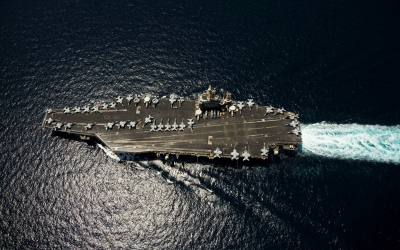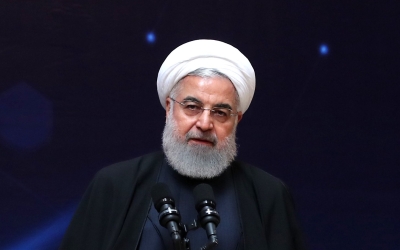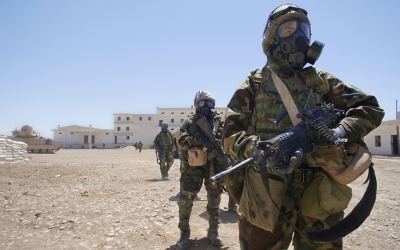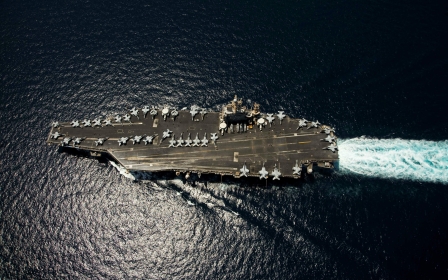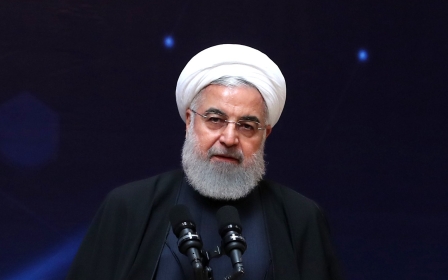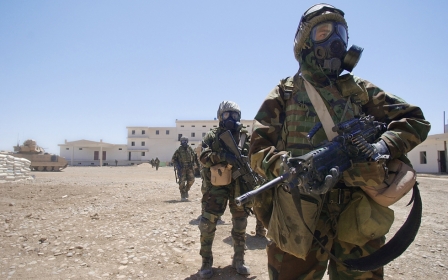Iran to restart some nuclear activity as tensions rise with US

Iran will restart part of its halted nuclear programme in response to the US withdrawal from a landmark 2015 nuclear deal, but does not itself plan to pull out of the agreement, the state-run IRIB news agency has said.
The move came as Iran's Supreme National Security Council (SNSC) described as "psychological warfare" a US announcement that it was sending an aircraft carrier, support ships and bombers to the Gulf to deliver a message to Tehran.
US acting Defence Secretary Patrick Shanahan said on Monday that he had approved sending the carrier strike group and aircraft because of indications of a "credible threat by Iranian regime forces" but did not provide any details on the underlying intelligence.
The deployment was to show that the US will retaliate with "unrelenting force" to any attack on its or its allies' interests, US national security adviser John Bolton said on Sunday.
"Bolton's statement is a clumsy use of a burnt-out happening for psychological warfare," said SNSC spokesman Keyvan Khosravi, according to Iran's Tasnim news agency, adding that the carrier had arrived in the Mediterranean weeks ago.
While neither Shanahan nor Bolton provided details on US intelligence, other US officials told the Reuters news agency there were "multiple, credible threats" against US forces on land, including in Iraq, by Iran and proxy forces and at sea.
"[It] represents a prudent repositioning of assets in response to indications of a credible threat by Iranian regime forces," Shanahan said on Twitter.
Nuclear restart
Citing a source close to an official commission which oversees the nuclear deal, IRIB reported on Monday that President Hassan Rouhani will announce in a speech on Wednesday that Iran would reduce some of its "minor and general" commitments under the deal - exactly one year after US President Donald Trump announced the US pullout.
Trump subsequently reimposed tough sanctions on Iran, including on its lifeblood oil exports with the stated intent of reducing them to zero and starving Iran's economy.
"The Islamic Republic of Iran, in reaction to the exit of America from the nuclear deal and the bad promises of European countries in carrying out their obligations, will restart a part of the nuclear activities which were stopped under the framework of the nuclear deal," the source said, according to IRIB.
Similarly, the semi-official Iranian Students' News Agency (ISNA) reported that Iran on Wednesday will announce "reciprocal actions" to the US withdrawal from the nuclear deal, quoting "knowledgeable sources".
Some European Union leaders had been unofficially told of Iran's decision, the report said.
Trump, who was not in office when the nuclear deal was negotiated, said it was flawed in Iran's favour for doing nothing to curb its ballistic missile programme, or its support of proxy forces in several Middle East wars.
Iran has said its development of ballistic missiles has nothing to do with its nuclear activity and is wholly defensive in nature, and that its support for allies around the Middle East is not Washington's business.
Pompeo makes unannounced visit to Iraq
US Secretary of State Mike Pompeo made an unannounced visit to Baghdad on Tuesday and met with the Iraqi prime minister and other senior officials after voicing US concern about Iraqi sovereignty due to increasing Iranian activity in the region.
"I wanted to go to Baghdad to speak with the leadership there, to assure them that we stood ready to continue to ensure that Iraq is a sovereign, independent nation," Pompeo told reporters en route to Baghdad to meet with Iraqi Prime Minister Adel Abdul Mahdi.
Asked if there was a threat to the Baghdad government from Iran that raised US concerns about Iraqi sovereignty, Pompeo said, "No, no, generally this has been our position since the national security strategy came out in the beginning of the Trump administration."
On Sunday, Pompeo issued a warning to the Islamic Republic, saying: "It is absolutely the case that we have seen escalatory actions from the Iranians and it is equally the case that we will hold the Iranians accountable for attacks on American interests."
"If these actions take place, if they do by some third-party proxy, a militia group, Hezbollah, we will hold the Iranian leadership directly accountable for that," Pompeo told reporters aboard a flight as he headed to an Arctic Council meeting in Finland.
The naval deployment marks the latest in a series of moves by the Trump administration aimed at ratcheting up pressure on Iran in recent months.
Washington recently said it will stop waivers for countries buying Iranian oil, in an attempt to reduce Iran's oil exports to zero.
It has also blacklisted Iran's elite Islamic Revolutionary Guard Corps, taking the unprecedented step of designating it as a foreign terrorist organisation.
In response to the designation, Rouhani signed a bill into law last week declaring all US forces in the Middle East terrorists and calling the US government a sponsor of terrorism.
Middle East Eye propose une couverture et une analyse indépendantes et incomparables du Moyen-Orient, de l’Afrique du Nord et d’autres régions du monde. Pour en savoir plus sur la reprise de ce contenu et les frais qui s’appliquent, veuillez remplir ce formulaire [en anglais]. Pour en savoir plus sur MEE, cliquez ici [en anglais].


